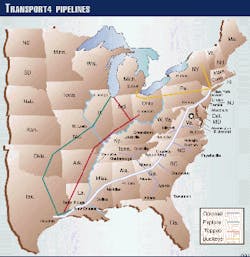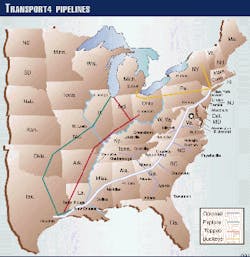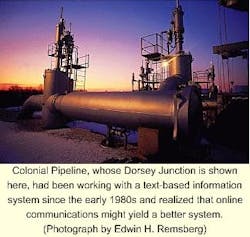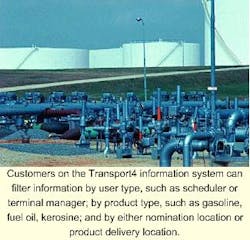U.S. product pipelines create on line operations system
Four U.S. pipeline companies have developed and implemented a unique, joint, internet-based information and communication system that enables customers to nominate, schedule, and confirm transportation of petroleum products online.
Buckeye Pipe Line, Macungie, Pa., Colonial Pipeline Co., Atlanta, Explorer Pipeline, Tulsa, and TE Products Pipeline Co. (Teppco), Houston, have joined to form Transport4, a limited liability corporation. The companies launched the service last month, as both customers and carriers logged onto the system and began to use it.
Buckeye covers the Northeast between New York harbor and Chicago as well as systems in New England and Florida. Colonial Pipeline transports product from the Texas and Louisiana coasts through the southern states and up through Virginia and Washington, D.C., terminating in New York City harbor.
Explorer moves product from the Louisiana and Texas Gulf Coast from Houston and Dallas through Oklahoma and Missouri to Chicago. Teppco ranges from Beaumont, Tex., through Arkansas and into the Ohio Valley ending in both the Cincinnati and Chicago areas, serving as well Pennsylvania and New York LPG markets.
Improved communications
For decades, the petroleum industry has relied on telephone calls, memoranda, and, more recently, faxes and text-based data transmission between customers and carriers to manage the transportation of product. No alternative existed.
In addition, each petroleum company has had its own protocols and batch codes for identifying and processing necessary information. This lack of standardization and reliance on phone calls and faxes, although the norm, have resulted in a procedural "mixed bag" of processes.
The recent emergence, however, of on line, interactive communications and of enhanced computer technologies has made possible development of a quicker, more comprehensive and reliable process.
Transport4 originated as an idea in 1997 as each of the four pipeline companies began examining its own data communications.
Colonial had been working with a text-based information system since the early 1980s and realized that on line communications might provide the opportunity to develop a better system. The company invited both Teppco and Explorer to participate in a joint customer research initiative.
Buckeye Pipe Line also met with Colonial during this period to discuss updating its scheduling system and other applications. Following a series of meetings and conversations between Buckeye, Colonial, Explorer, and Teppco, the four companies agreed to cooperate in conducting research and evaluating the results.
Customer-driven
Through surveys and focus groups, potential users such as shippers, traders, schedulers, terminal operators, and others involved in the distribution system were asked to speculate on what they thought an on line information system should provide and how that information should be offered.
The most crucial factor identified by research participants was "commonality"-sharing common information between systems-and the need for a uniform designation for batch numbers and product grade codes. Users also specified that they needed quick access to information and timely communication of necessary data.
Transport4 was then designed and developed in direct response to these specifications. The Transport4 partners engaged software design company Proxicom, Reston, Va., to work on the project. The main challenge was to merge the divergent data systems of the partners so that each company's information system could "talk" with the others and interact through Transport4.
Development and testing focused on two areas:
- Each company had to be able to talk to the Transport4 interface.
- Each company had to be able to interface with the systems of each of the other three.
Maintaining confidentiality between the companies was of greatest concern. Working with Proxicom, the partners designed and built a customized security model, the most difficult and crucial component in the system.
They also designed Transport4 to allow each partner to maintain its unique business protocols and internal processing systems. The carriers enter and exit through a virtual private-data network that links them to Transport4 and its users.
In addition, they have selected third-party vendors to provide the software coding and day-to-day operations, freeing internal resources.
The core of the application is quick access to data through the system's query and display function. The interactive, fully secure, Windows-based internet interface enables users to enter and change nominations, receive schedules, generate product-transfer orders, view tickets, grant and receive third-party tickets, and manage inventory.
It also provides users with access to necessary information on transportation of petroleum products within the four partners' systems.
Transport4 gives customers the ability to receive or send data under their own control. Users can choose from a number of formats how they want to send and receive information: by html (hypertext markup language), e-mail, fax, or a downloaded text file.
They can also select functions to generate queries regularly on such information as schedules and ticket updates, specifying when they want to receive information and updates and how often. As new information becomes available, it is automatically generated and "pushed" (sent) to the customer.
In addition, customers can change their e-mail passwords when necessary. They can filter information by user type, such as scheduler or terminal manager; by product type, such as gasoline, fuel oil, kerosine; and by either nomination location or product delivery location.
Each company's administrator can set his or her own use parameters and the format that works best for his system. Customer companies will administer their own users; a single company could have multiple users.
Finally, one of the greatest benefits of Transport4 is that its use can improve employee productivity by streamlining the nomination process, freeing the staff to handle other tasks.
Transport4 is available 24 hr/day, 7 days a week (24/7) and accessible through its internet site (www.transport4.com). Hardware and software required for access and use of the system are a desktop computer with internet capability and an internet browser such as Microsoft Internet Explorer 4.x or Netscape Navigator 4.x.
Customers register with Transport4 and are issued a password, enabling them to sign in and enter the system.
Functions
In addition to current events and helpful information, the homepage presents the necessary function icons across the top of the screen. Users can gain access to any function by clicking on the appropriate icon.
Nominations. This core function of Transport4 furnishes access to the system's standard data entry screens through which the user can input specific order data, make changes, request confirmations, and enter queries.
Information can be retrieved simultaneously from multiple carriers. Customers are able to access information through one standardized data system while maintaining their own companies' data protocols.
Alerts. This function acknowledges orders and notifies users of order status, confirming approval or rejection. It also alerts customers when an action is required and provides information to suppliers and consignees or to tankers, allowing them to confirm or reject a nomination.
Allocations. With a flexible data format, the "Allocations" function enables users to query and view information on the allocation rules and guidelines of specific carriers.
Third-party tickets. Third-party ticketing offers optional access to a central tracking system to enable users to monitor and forward transaction information at the interface point. The third-party ticketing grant function is integrated with the Nomination, Tickets, and Product-Transfer Order (PTO; presently discussed) functions.
Schedules. Scheduling data acquired from carrier information and updates are available through this function, which enables users to query the system to provide new and revised scheduling information from multiple carriers.
The data can be delivered to the customer in a standard data format, regardless of the interface, from an automated online system to a fax machine.
Location volume updates. Users can request and receive automatic updates from their customers on current inventory levels.
Tickets. The ticket function allows users to query and receive a listing of tickets in either a "short form" summary of crucial ticket fields or a "long form" of all data on the ticket. Carriers can apply their own data protocols, customizing the appearance and content of their tickets and creating multiple ticket types.
Customer, carrier information manager. Through this manager, customers can obtain a variety of carrier information such as user manuals, operating guides, and tariffs. Users can also access a database of information on carrier and customer contacts.
Bulletins. Carriers can post bulletins online through the use of this function; the system automatically advises customers of any that are unread.
Administration. A variety of support services is available through the administration function.
Each user can edit personal contact information, designated e-mail and fax numbers, change his or her password or name, inquire into his account's activities, as well as set up "push" functions for automatic delivery of tickets or schedule queries.
Using the Administration function, each customer's company administrator can manage user access to the Transport4 system.
Help. A substantive online help reference enables users to obtain detailed instructions and answers to frequently asked questions. Transport4 will also offer help desk assistance 24/7.
Future Transport4 functions, currently in development, will include the following:
Product-transfer orders. PTOs facilitate the transfer of product from one shipper account to another. The Transport4 PTO function will permit entry, confirmation, and inquiries regarding PTO information. The format will manage whatever inventory tracking system is employed by the user, whether batch, inventory, or a combination of the two.
Users may access only the information they have entered or been granted access by a third party.
Billing. Using this function, customers may access, view, and print carrier invoices with a "short form" listing of invoice fields to identify specific invoices. The system will interface with either PDF (portable document format) or html.
Inventory. This function will offer monthly and month-to-date inventory summaries with details of the data listed by product. Users will select the format in which they choose to receive the information.
Electronic data exchange (EDI). Transport4 will support traditional EDI services being offered now by the individual carriers through VANs (value-added networks) and will explore and support other methods of facilitating point-to-point communications over the internet.
Costs; fees
The partners have shared the costs of the multimillion dollar development and implementation of Transport4 and will continue to do so with its maintenance and management.
Although there are minimal fees for some services such as faxed notification, EDI, and third-party ticketing, the core services of Transport4--nominations, queries, schedules, and alerts--are provided free to users.
Just as customer feedback served as the main driver in development of Transport4, such feedback will be used to refine and enhance the system. August's roll-out follows months of testing and preparation during which many enhancements have been made and response times improved tenfold.
In the months of the initial launch, Transport4 will hold partial-day training classes for 200-300 schedulers, each class with 10-20 people, beginning with regional classes held in Houston, Tulsa, Chicago, and New York. Future sessions will be added as necessary.
Attendees will be required to have experience with the fundamentals of computer use and a working knowledge of Windows-based applications and the internet.
The partners' expectation is that, based on customer acceptance and with training and guidance, Transport4 will become the de facto standard for petroleum-transportation information management. They expect to reach that goal by continuing to gather customer feedback, modifying the system according to customer requirements, allowing customers to drive the system's evolution, and signing on additional carriers.
null
null
The Authors
Mike Frazier is senior manager of transportation at Buckeye Pipe Line and serves on the board of directors of Transport4. After 30 years' experience in operations and in scheduling and control center, he has direct responsibility for customer service, scheduling, and quality control and measurement.
Buster Brown is business development coordinator for Colonial Pipeline Co. and vice-president of operations for Transport4. He holds a BS in chemical engineering from the University of Arkansas.
Rod Sands is vice-president of operations for Explorer Pipeline Co. and serves on the Transport4 board. He received his BS in chemical engineering from the University of Missouri and associate degree in engineering from Metropolitan Kansas City Junior College.
Donald C. Thomas is manager of refined products services for Teppco and is Teppco's representative to the Transport4 board of directors. He holds a BS in electrical engineering from South Dakota State University and an MBA from New Mexico State University.







